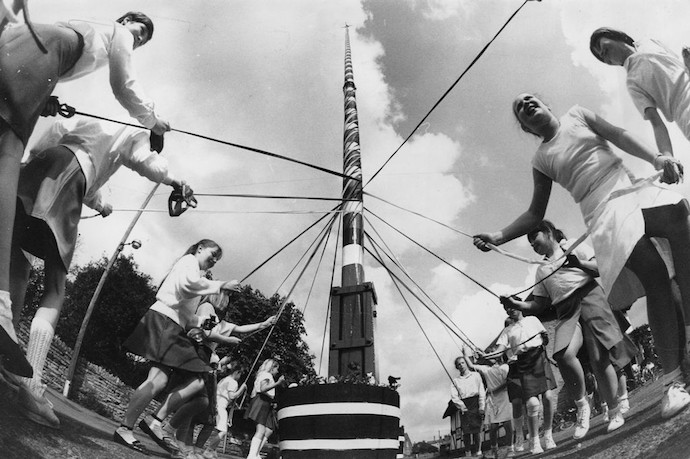May 1st 1628 was the second time that Thomas Morton had erected a Maypole at his colony in Merrymount; but it was to be the decisive event in getting him arrested and exiled by his fellow Englishmen. Morton—the forgotten Cavalier poet who was one of New England’s founders—envisioned an alternative America starkly different from that of his nemesis William Bradford, governor of Plymouth. As Nathaniel Hawthorne would put it two centuries later, “Jollity and gloom were contending for an empire.”
The Maypole (and its cousin the Liberty Pole) was not Morton’s invention. Rather, the tradition of stripping a tree and dancing around it to mark the beginning of spring date back to pagan Europe, and endured as a popular practice through medieval Catholicism.
During the Reformation such things were often outlawed (to the chagrin of many), so Morton’s Maypole was a veritable declaration of independence. Bradford ignored the first marking of May Day by Morton and his “crew of Comus,” but in 1628 he couldn’t ignore the poet’s sale of arms to the Algonquin, his flagrantly libertine colony, or his latest Maypole, this time with poems dedicated to Neptune, Triton, Hymen and Priapus affixed to its side (among the earliest of English language poetry in America). And so, Miles Standish was dispatched, the Maypole was cut down, and Morton was sent in chains back to an England on the verge of civil war.
Bradford writes that that May Day saw, “drinking and dancing… inviting the Indian women, for their consorts, dancing and frisking together …As if they had anew revived & celebrated the…beastly practices of ye mad Bacchanalians.”
Fairly or not, the Calvinists of Plymouth and Massachusetts have often been conceptualized as the forefathers of our sexual conservatism, our xenophobia, and our break-neck work ethic. In this understanding Morton is seen as both alternative to, and forgotten promise of, what a different American utopia could have been. As literary critic Leslie Fiedler wondered, “what would have happened if it had survived, this beatnik colony in the seventeenth-century New England woods, presided over by university Bohemians?”
In most modern contexts May Day is a celebration of working class solidarity, but for pagans it was a celebration of nature, and for radicals a day for our fellow humans. As unfettered industrial capitalism has found a way to denigrate social relations and the environment alike, it makes sense that we should honor both on a single day. The earth and other people are the legacy of May Day.
Morton was a complex character, in many ways a conservative creature of his era, yet he intuitively understood the primal import of the Maypole. This year, pause work and observe life, celebrating May Day as though Morton’s Jollity had been victorious.





